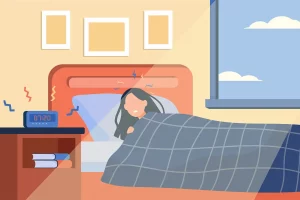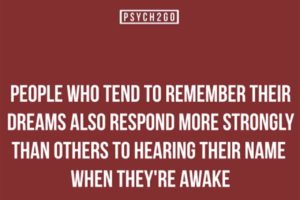- Strategies for starting your day off on the right foot include waking up to a melodic alarm tone, avoiding hitting snooze, and choosing content wisely when checking your phone first thing in the morning.
- Yawning and stretching in bed, doing gentle exercises at the edge of your bed, drinking water, and breathing dynamically are also effective ways to wake up your body and mind.
- Taking a shower and ending with a burst of cold water can help increase alertness and improve mood.
Waking up in the morning can be a struggle for many of us, but those first few moments after getting out of bed are crucial for setting the tone for the rest of the day. With the help of experts, we’ve compiled a list of strategies to help you start your day off on the right foot.
How Long Does It Take To Fully Wake Up?
The amount of time it takes for your body to fully wake up can vary depending on factors like body temperature, hormonal secretions (especially cortisol), and sleep inertia, the feeling of grogginess that lingers after waking up. This can last anywhere from 10 minutes on average to up to 4 hours in some people. “Generally speaking, morning people tend to wake up feeling more alert, while evening people may need more time to get going,” notes Dr. Royant-Parola, a sleep specialist psychiatrist. If you’re someone who takes a while to fully wake up, consider starting your day with repetitive tasks that require minimal attention or thinking (like sorting through your emails).
1. How To Wake Up Early? Choose A Musical Ringtone!
Rather than a blaring beep or harsh sound, a 2020 Australian study of 50 people found that using music as an alarm tone resulted in higher levels of alertness and quicker, more accurate responses to phone tests. Choose a melodic alarm tone instead. On Android (via the Google Clock app) or iOS, you can even select a song from a Spotify or Apple Music playlist.
2. Resist Snoozing
Despite being a common habit for 64% of French people, hitting the snooze button to gain an extra 5 or 10 minutes of sleep is actually counterproductive. “You’re not really falling back asleep, but you’re not fully awake either. Each new snooze activates a stress response, even if the sound is soft, which isn’t restorative,” warns Dr. Royant-Parola.
Is Checking Your Phone First Thing In The Morning A Bad Idea?
For over half of French people (and 80% of those aged 18-34), checking their smartphone is the first thing they do upon waking up. “Don’t do it in bed, to avoid lingering there. However, the blue light emitted from screens isn’t a problem in the morning and can even help stimulate wakefulness,” says Dr. Royant-Parola. It’s important to choose your content wisely though. “Studies have shown that scrolling through social media content releases dopamine, a hormone that can help boost your mood and energy levels,” explains Clément Le Coz, a psychologist and mental preparation specialist. However, if you’re already prone to stress or negativity, it’s best to steer clear of anxiety-inducing news sites or work emails.
3. Stretch Your Body In The Morning, Before Getting Out Of Bed
Start by yawning and stretching your arms above your head, arch your back, and stretch your body. These innate movements are present upon awakening in babies and many animals. According to Dr. Sylvie Royant-Parola, “the act of yawning and stretching activates nerve centers involved in wakefulness,” sending a signal to your brain that the day is starting. “Then, you need to gradually unlock your stiff back from the night,” adds sports coach Lucile Woodward.
- Bring your knees to your chest and rest your feet, 2 or 3 times.
- Stretch both legs toward the ceiling (without forcing or fully extending) for a few seconds.
- Bring both knees to one side and then the other, keeping your shoulders flat on the bed.
4. Do Gentle Exercises At The Edge Of Your Bed
This solution allows you to unlock your joints and avoid feeling dizzy when you get up, especially if you have balance problems. Here are some examples of gentle physical exercises to do:
Inhale and raise both arms above your head from the sides, then lower them while exhaling 3 times. “Associating breathing with movement is very energizing,” says Lucile Woodward.
- Hands above your head, lean to the right side, then let your arms and torso fall forward, back curled, belly against your knees, before coming back up, uncurling your spine. Same thing on the left side.
- Place your hands far behind you on the mattress.
- Inhale, open your chest, and shoulders, and arch your lower back, head up.
- Exhale, release, and curl. Do this 3 times.
- Make small circles with your head to unlock your neck, clockwise and counterclockwise, “without trying to go too far back,” adds the coach.
5. Drink A Glass Of Water
Swallowing a few sips of room-temperature water upon waking up helps rehydrate your body, which has been deprived of water for several hours. It also helps eliminate mucus accumulated during the night on the throat and vocal cords, allowing you to regain your voice more quickly. However, the detox effects of lemon juice on an empty stomach in the morning have never been proven.
6. Breathe Dynamically
“Unlike slow and deep breaths that calm down, in the morning, we need rather a high and rapid breath that activates the sympathetic nervous system to give energy,” explains Clément Le Coz. Sitting or standing, inhale for a few seconds, letting your chest, clavicles, and shoulders open up, holding your breath for a few seconds with your lungs full, then exhale forcefully through your mouth. Do this 3 to 4 times. You can do this in front of an open window when you are airing out your room to oxygenate even more, provided you are well covered. Repeat in the morning or afternoon if needed.
7. Take A Shower (And End With A Blast Of Cold Water)
If you wake up early “Even if you think you’re saving time in the morning by showering at night, it’s a bad calculation because a shower activates alertness,” explains Dr. Royant-Parola. A study has shown that adults who end their showers with 30 to 90 seconds of cold water feel a surge of energy similar to that of caffeine. This stimulates circulation, metabolism, and the sympathetic nervous system (to increase blood pressure and heart rate). “It’s difficult to do it all over the body, especially in winter, but you can do it only on the legs, up to the buttocks,” advises Lucile Woodward.
8. Rub Yourself
In the shower or when getting dressed, this simple solution tones and warms up the body through mechanical stimulation. Rub your hands together quickly, then rub them for 20 seconds flat against your kidneys (at the bottom of your back, on each side of the spine) to stimulate the adrenal glands. You can use one to two drops of black spruce essential oil for a tonic effect (it stimulates cortisol secretion), diluted in a vegetable oil or body milk. Never use this method if you have health problems such as asthma or epilepsy.
9. Fill Up On Light
It is the best biological clock synchronizer: it sends a signal to the brain that it is daytime and time to be active. To feel energized more quickly, if it is already daylight, have breakfast near a window to enjoy any sunlight. “Otherwise, make sure you have a sufficiently bright light in the kitchen or living room, with a light close to daylight, neither too cold nor too warm,” says the psychiatrist. Opt for a bulb between 5,000 and 6,500 Kelvin.
10. Treat Yourself To A Self-Massage To Decongest Your Face When Tired
This helps to promote microcirculation and decongest when you feel puffy due to fatigue. Place your hands in a shell shape over your closed eyelids, then alternate gentle circular movements and strokes on your forehead, temples, cheeks, and chin… as if you were washing your face. Finish with gentle tapping with your fingertips, don’t forget the eye area. The best time to do this is when applying your day cream.
Read More:
⇛ How To Fall Asleep Within 60 Seconds
⇛ Getting Up Early: The Best Time To Set Your Alarm Clock
⇛ How To Start The Day Full Of Energy?













